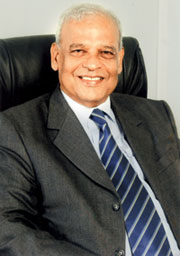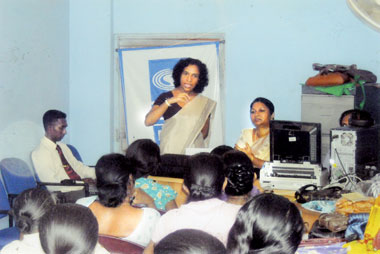|
Empowering rural communities:
Home-made solutions vital - Sanasa Bank Chairman
by L. S. Ananda WEDAARACHCHI
|

Dr. P. A. Kiriwandeniya
|
We should have home-made solutions for our problems rather than
depending on outsiders such as the World Bank, said Sanasa Development
Bank Chairman, Dr. P. A. Kiriwandeniya.
The open economic policies introduced by the J. R. Jayawardene regime
in 1970's alienated the rural sector especially the village-based small
scale entrepreneurs. The cooperative Thrift and Credit Societies
introduced to Sri Lanka in 1906 were reorganised in the form of Sanasa
in 1978 to improve the lot of the rural community.
At present 160,000 village-based entrepreneurs out of 400,000 Sanasa
members carry out their businesses successfully, Dr. Kiriwandeniya said.
The Sunday Observer interviewed Dr. Kiriwandeniya with special
reference to his home-spun financial policies. Excerpts of the
interview:
Q: A very few people in the country's financial sector
practise home-made policies. You are one of them. Do you have solutions
to problems faced by the country?
A: Had we followed the correct policies after the national
independence, we would not have faced the current problems.
The political leaders, policy-makers and bureaucrats still followed
pre-independent policies as a dependent nation with people expecting
everything from abroad. Rice and other subsidiary food crops such as
chilies, onions and other commodities are still being imported.
The World Bank assistance were sought to cushion budget deficities.
Even after independence there was no sense of national pride or feeling
among the rulers and the people. The situation underwent a radical
change in the late 1970s when the open market policies were introduced.
There should have been plans to identify the skills, talents and
capabilities of the people to have them harness for the development of
the country.
|

A Sanasa training session in progress |
Gampaha and Kalutara districts were far more advanced than other
districts since all major industries were set up there. The gap between
the haves and have-not has widened.
Moneragala - Hambantota and even Kandy districts remained in the
backyard due to the shortsighted policies implemented upto 1994.
Q: Now that President Mahinda Rajapaksa has cleaned the Augean
stable and established peace, it is the right time to implement your
policies. Your comments?
A: Since the country is totally free from terrorism - we
should begin rebuilding the shattered social fabric. We have to live and
work together irrespective of religious, cultural and ethnic
differences.
Now is time for us to unite if we are to prosper. Even before the
defeat of terrorism we had begun pooling our economic and knowledge to
create a new milieu for communities to live in.
The lack of a solid religious foundation which witnessed a
depreciation of national values such as culture and heritage was one of
the biggest challenges we faced in analysing the problems that devided
communities.
It is important to make the younger generations aware of the
important role our forefathers played in enriching and preserving the
national values.
It is this heritage that prompted us to institute grass roots
programs in the longer interest of village awakening.
Q: Can you elaborate the economic policies which you have
implemented?
A: Our micro platform is our economic sustainability
foundation since the inception of the Sanasa Development Bank and Sanasa
Cooperative Movement, we have nurtured and strengthend our unique micro
finance model empowering communities while playing a vital role in
poverty alleviation. We also infuse environmental awareness and
environment friendly and economically viable projects.
Our mandate is to uplift communities economically and ensure that
they become sustainable and responsible for their actions socially and
environmentally .
Q: During the last three years the Sanasa Development Bank has
expanded its network in the Northern and the eastern parts of the
country. Would you explain.
A: The network of over 8,000 Sanasa Primary Cooperative
Societies, operate under the apex organisation, the Sanasa Movement. The
primary societies are affiliated to the Sanasa district unions or the
federation. It is creditable that these cooperative credit and thrift
societies have remained the backbone of the country's micro financing
cooperative network for over a century. While the lifeline of micro
financing remained primarily within the cooperative movement, the
transforming global and technological milieu spurred the genesis of the
Sanasa Development Bank in order to streamline the development of the
overall Sanasa Movement.
Q: Sanasa movement has its network extended to areas such as
engineering development insurance and education. What are the objectives
of such ventures?
A: The Sanasa Group has an integral role to play in ensuring
that the country's micro financing industry adequately contributes to
the overall economic development.
This necessitated the addition of other complementary entities to add
value to our final goal.
The Sanasa Engineering and Development Company - SEDCO - set up to
develop the infrastructure and cater to the increasing demand for
specialised engineering and construction services especially in
community projects linked to water, sanitation and waste management.
The Sanasa Consumer Producer Alliance (SANIPA) was conceived to
bridge the gap between the consumer and producer helping to ease the
burden of both.
Sanasa Education Campus in Kegalle was set up to provide training and
developing culture for the entire Sanasa movement. |

